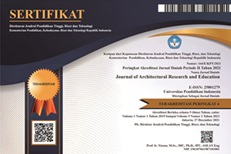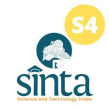The Effect of Student's Interpersonal Communication Skills On Student's Learning Outcomes In Mechanical Engineering Subjects
Abstract
The differences in student’s background, cognitive, language learning, motor skills, talents and readiness cause the difference of their communication skills. By knowing the different abilities that exist in students, teachers will likely be able to provide learning in the right way. This study was conducted to determine how much the effect of student’s interpersonal communication skills on student’s learning outcomes in Mechanical Engineering subjec. There are 96 samples in this study which also the students of X DPIB 1,2,3 SMK Negeri 2 Garut. The test of student's interpersonal communication skills is a research instrument that author developed, while student’s learning outcomes are seen from the final score of Mechanical Engineering subject on the even semester of 2020/2021 school year. The data analysis technique that used in this study is an aproach of correlation, determination, and simple linear regression analysis. Based on regression analysis, the results showed that there was a positive and significant effect on student’s interpersonal communication skills on student learning outcomes in Mechanical Engineering subject. It means that the better the student’s interpersonal communication skills, also the better their learning outcomes in Mechanical Engineering subjects.
Keywords
Full Text:
PDFReferences
Kaprowska, J. (2008). Communication and Interpersonal Skills in Social Work. Exeter: Learning Matters Ltd. (Accesed on December 8th 2020 from http://ndl.ethernet.edu.et/bitstream/123456789/50023/1/21.Juliet%20Koprowska.pdf)
Mahmudi, A. (2006). Pengembangan Kemampuan Komunikasi Matematika Siswa Melalui Pembelajaran Matematika. Trend Penelitian dan Pembelajaran Matematika di Era ICT. (Accesed on July 25th 2021 from https://eprints.uny.ac.id/7247/1/PM-10%20-%20Ali%20Mahmudi.pdf)
Mulyana, D. (2003). Ilmu Komunikasi Suatu Pengantar. Remaja Rosdakarya.
Murfihenni, W. (2014). Mekanika Teknik Semester 1. Jakarta: Kemendikbud RI.
Novia, D. R. (2021). Sekolah Online di Tengah Pandemi, Anak Tak Hanya Butuh Tugas Saja. Okezone. (Accesed on July 20th 2021 from https://lifestyle.okezone.com/read/2021/04
/08/612/2391256/sekolah-online-di-tengah-pandemi-anak-tak-hanya-butuh-tugas-saja)
Nurdin, A. (2020). Teori Komunikasi Interpersonal. Jakarta: Kencana.
Rozaq, F. (2012). Hubungan Komunikasi Interpersonal Antara Guru dan Siswa dengan Keaktifan Belajar Siswa Kelas XI Program Keahlian Teknik Otomotif di SMK Muhammadiyah 4 Klaten Tengah Tahun Ajaran 2012/2013. Yogyakarta: Universitas Negeri Yogyakarta.( Accesed on November 11th 2020 from http://eprints.uny.ac.id/20288/1/FADLI%20
ROZAQ%2008504241036.pdf)
Saputra, S. A. (2007). Evaluasi Pengajaran. Bandung: Universitas Pendidikan Indonesia.
Sharp, C. (2005). What Can We Learn From Research? Developing Young Children's Creativity .
Sugiyono. (2013). Metode Penelitian Kuantitatif Kualitatif dan R & D. Bandung: Alfabeta.
Sudjana, N. (2005). Penilaian Hasil Proses Belajar Mengajar. Bandung: PT Remaja Rosdakarya.
Suranto, A. W. (2011). Komunikasi Interpersonal. Yogyakarta: Ar-Ruzz Media.
Trianingsih, L. (2014). Hubungan Interpersonal Guru-Siswa dengan Prestasi Belajar Siswa Kelas XII Paket Keahlian Teknik Gambar Bangunan di SMK Negeri 2 Yogyakarta. Yogyakarta: Universitas Negeri Yogyakarta. (Accesed on December 11th 2020 from http://eprints.uny.
ac.id/20542/1/Lilis%20Trianingsih%2010505244037.pdf)
West, R., & Turner, L. H. (2010). Introducing Communication Theory : Analysis and Application. New York: McGraw Hill. (Diunduh pada 5 Januari 2021 dari https://polifilosofie.files.wordpress.com/2019/01/introducing-communication-theory.-analysis-and-application.-fourth-edition-mcgraw-hill-2010.pdf)
Yuliara, I. M. (2016). Regresi Linier Sederhana. Denpasar: Universitas Udayana. (Accesed on April 30th 2021 from https://simdos.unud.ac.id/uploads/file_pe ndidikan_1_dir/321812643
fa0771ddb555f70be42.pdf)
Zandvliet, D., Brok, P. d., Mainhard, T., & Tartwijk, J. V. (2014). Interpersonal Relationships in Education : From Theory to Practice . Rotterdam: SensePublishers. (Accesed on December 9th 2020 from https://scholar.harvard.edu/files/marietta/files/king_and_
marietta_-_interpersonal_relationships.pdf)
DOI: https://doi.org/10.17509/jare.v3i2.37402
Refbacks
Copyright (c) 2021 Journal of Architectural Research and Education

This work is licensed under a Creative Commons Attribution-NonCommercial-ShareAlike 4.0 International License.

This work is licensed under a Creative Commons Attribution-ShareAlike 4.0 International License.








